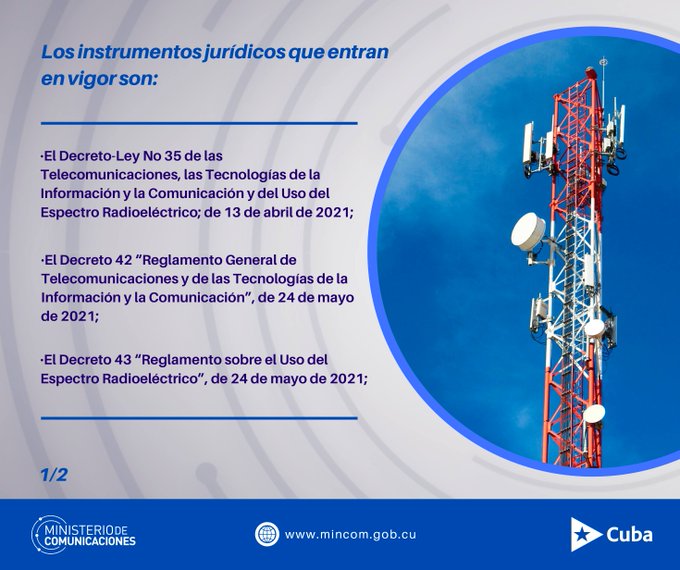
17 August 2021 | For: Institutional Communication Directorate
The Constitution of the Republic of Cuba, in its Article 16, ratifies the State's commitment to building an information and knowledge society centered on the person, inclusive and oriented towards sustainable development, in which everyone can create, consult, use and share information and knowledge to improve their quality of life. Under this precept, new legal instruments come into force, which are made up of: Decree-Law No. 35 on Telecommunications, Information and Communication Technologies and the Use of the Radioelectric Spectrum; of April 13, 2021; Decree 42 "General Regulation of Telecommunications and Information and Communication Technologies", of May 24, 2021; Decree 43 “Regulation on the Use of the Radioelectric Spectrum”, of May 24, 2021; Resolution 108 "Regulation of Interconnection, access and essential installations of telecommunications networks", of August 9, 2021, of the Ministry of Communications; Resolution 107 "Regulations for the use of satellite radiocommunications services" of August 9, 2021, of the Ministry of Communications; Resolution 105 "National Action Model for responding to Cybersecurity incidents", of August 9, 2021, of the Ministry of Communications. Decree-Law No. 35 ¨Of Telecommunications, Information and Communication Technologies and the use of the Radioelectric Spectrum¨; It is the first legal standard of superior rank approved in our country on Telecommunications services, Information and Communication Technologies and on the Use of the Radioelectric Spectrum. This Decree is transversal in the processes of society, which allows greater coherence and ordering of the existing regulatory framework. Its complementary norms are aimed at development, technological convergence and prioritizing the implementation of broadband networks, as well as protecting the interests of citizens and their constitutional rights, by contributing to the political, economic and social development of the country, through development and modernization of telecommunications infrastructures and, furthermore, promote the harmonious and orderly progress of telecommunications / ICT networks and services.
For this, the State designates the Ministry of Communications as rector in the development and modernization of telecommunications infrastructures with an emphasis on broadband and broadcasting, the maximum use of these with integrity, rationality and the maximization of their contribution to economic development and social services of the nation, as well as people's access to the Internet and other value-added telecommunications services, through authorized public service operators. Decree Law 35, likewise, ratifies the principle of equality, privacy and secrecy in communications; for which users have the right to access in conditions of equality and affordability to all public telecommunications / ICT services provided in the country and to receive them with quality and efficient, equitable, and non-discriminatory treatment, to be protected against interference harmful and the operators and service providers to guarantee the secrecy and inviolability of the information transmitted by their networks and the privacy of the personal data that are informed by the users. Resolution 105 “National Action Model for responding to Cybersecurity incidents”, for its part, is the implementation of what is established in Decree 360/2019. It is preventive in nature and reaches out to the whole of society, by implementing a work system among entities specialized in ICT security for the fulfillment of their functions in the secure exchange of information related to cybersecurity vulnerabilities and incidents. In addition, it enables, based on duties and rights, the protection without differences of citizens, civil society and state and private institutions of all kinds. For the first time in Cuba, in a legal norm, they are associated with cybersecurity incidents, typifications that exceed the limits of technology, grouping various incidents into categories and subcategories. Likewise, it transcends other spheres of the development of society and the lives of its citizens. This allows us to understand terms and categories of events of which the population is not yet aware, but their ignorance can cause harm.